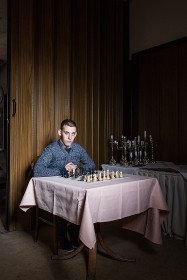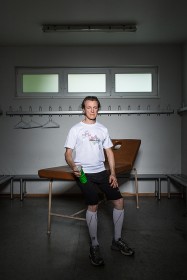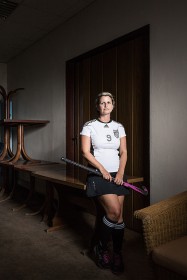The 14th European Maccabi Games (EMG) are taking place in Berlin from 27 July until 5 August 2015. More than 2,000 Jewish athletes from 36 countries will compete in 19 sports from football to fencing to chess. To accompany the games Tamar Lewinsky and Theresia Ziehe are producing a series of portraits with interviews, introducing a new member of the German delegation from Berlin every day here on the blog. They conducted the interviews on the grounds of the TuS Maccabi in Berlin’s Grunewald where Stephan Pramme also shot the portraits.
Leonid Sawlin, 16, chess

Leonid (16) chess © Jewish Museum Berlin, photo: Stephan Pramme
Leonid, why are you participating in the European Maccabi Games?
The games are really fun. I see friends from other cities, and I’m also learning because there are two grand masters here as coaches. They’re teaching me a lot. And of course I’m proud to get to take part in a European championship.
Jewish athletes were barred from the 1936 Olympics. Does that play a role for you, considering that some of the competitions this year are taking place at Berlin’s Olympic Stadium?
That’s hard to explain. Germany tries to deal with its past but at the same time, it’s not possible to make amends for what happened. → continue reading
The 14th European Maccabi Games (EMG) are taking place in Berlin from 27 July until 5 August 2015. More than 2,000 Jewish athletes from 36 countries will compete in 19 sports from football to fencing to chess. To accompany the games Tamar Lewinsky and Theresia Ziehe are producing a series of portraits with interviews, introducing a new member of the German delegation from Berlin every day here on the blog. They conducted the interviews on the grounds of the TuS Maccabi in Berlin’s Grunewald where Stephan Pramme also shot the portraits.
Dr. Daniel Hoffmann (54), half marathon
Daniel, what does it mean to you that the European Maccabi Games are taking place this year not only in Berlin but on the grounds built for the 1936 Olympics?

Daniel (54) half marathon © Jewish Museum Berlin, photo: Stephan Pramme
It’s a really nice feeling to demonstrate that Jews still live in Germany – and live active lives that they can show outwardly. That’s important and beneficial. And being in the Olympic Stadium is also a wonderful thing – out on the field in front of the enormous bleachers. It’s really something special, in addition to the historical aspect. It’s simply overwhelming, every time. It certainly makes it easier that the games are happening in my hometown. (He laughs.) I can sleep at home and go straight from there to the tournaments. Though I would have also participated, had they taken place somewhere else. And I hope to join in the next Maccabi Games in Israel.
What role does Judaism play for you personally?
That has changed in recent years. → continue reading
The 14th European Maccabi Games (EMG) are taking place in Berlin from 27 July until 5 August 2015. More than 2,000 Jewish athletes from 36 countries will compete in 19 sports from football to fencing to chess. To accompany the games Tamar Lewinsky and Theresia Ziehe are producing a series of portraits with interviews, introducing a new member of the German delegation from Berlin every day here on the blog. They conducted the interviews on the grounds of the TuS Maccabi in Berlin’s Grunewald where Stephan Pramme also shot the portraits.
Katharina Goos (39), hockey
Katharina, what does it mean to you that the European Maccabi Games are taking place in Berlin?

Katharina (39) hockey © Jewish Museum Berlin, photo: Stephan Pramme
This is a real happening! When we heard two years ago that the Maccabi Games would come to Berlin, of course there was a lot of excitement. I had hoped that we would do the opening ceremony at the Brandenburg Gate, but unfortunately it didn’t work out. Still, getting to participate at the Olympic Stadium is fantastic. And I’m very happy that my parents can make it here this time. Because when the Games take place in other countries, your friends and family generally don’t come.
What role does representing Germany in these Games play for you?
I’m proud to be German, and I’m also proud to be a German Jew. I’ve lived in a number of other countries where I was often asked, as a Jew, how can you live in Germany? → continue reading


